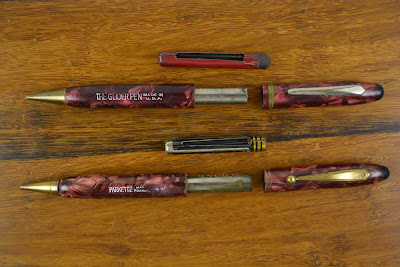This article has been edited and included in The Leadhead's Pencil Blog Volume 5; copies are available print on demand through Amazon here, and I offer an ebook version in pdf format at the Legendary Lead Company here.
If you don't want the book but you enjoy this article, please consider supporting the Blog project here.
When I decided to reorganize the museum, I also reorganized a vast library of pictures I had taken over the last six years. I was so certain I had written about the pencil I’m about to tell you about it that it wasn’t until I’d spent more time than I care to admit searching back through the blog for it -- when I couldn't find it, I dove into that picture archive as a last resort. Apparently it was something I thought about so much I was convinced I'd written about it, but never did. Here it is, posed alongside a Parker Parkette pencil from around 1937 or so:
The pencil is marked simply “The Glider Pen”:
I bought the pencil because something didn’t make sense about the name. “Glider” is a name associated with Conklin, not with Parker – and this piece and the Conklin Gliders were made too closely together in time for the two companies to not be tripping all over each other. Even though no trademark appeared to have been registered for “Glider” (at least none prior to 1953, the end date for American Writing Instrument Trademarks 1870-1953), we know for sure Conklin used it, and there’s absolutely no question in my mind that Parker made my “Glider Pen” pencil:
Right down to the distinctive, proprietary spare lead cartridge you’ll find on a Parker; the only real difference is that it’s painted plain red with no markings:
Now we’re ready to circle back around to that pencil I was musing about yesterday, and which I conclusively attribute to Conklin solely on the basis of the clip and the round top button:
Was I too hasty? I don’t think so – not when I show you what’s inside it:
So we have a “Glider Pen” pencil clearly made by Parker, and we have a Conklin Minuteman pencil with some of the same characteristics. Parker fans, you can sharpen your pitchforks and light your torches, but you have to admit that leads me to ask an obvious question:
Could Parker have had something to do with making such crappy stuff for Conklin in its dying days?






1 comment:
Post a Comment